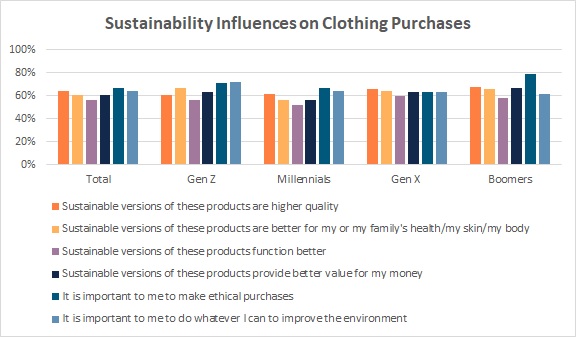A new report from the United Nations Environment Programme says greenhouse gas emissions reached a new high in 2022 and by September 2023, global average temperatures were 1.8°C above pre-industrial levels, a number that portends the planet is likely to see its warmest year on record. But proposed legislation both in the U.S. and Europe for more sustainable product regulation aims to help change these numbers, especially through the adoption of digital product passports.
Protokol, a specialist web3 development and consulting partner, describes digital product passports (DPPs) as tools for collecting and sharing product data throughout a product’s lifecycle to illustrate its sustainability, as well as its environmental and recyclability attributes.
Digitally connected products are a game-changer for everything from collaboration through to customer satisfaction, product development, supply chain efficiency, compliance and circularity.
Avery Dennison
“Although the concept of ‘cradle-to-grave’ product tracking isn’t new, utilizing blockchain technology to record and cryptographically secure product data through a Digital Product Passport is an emerging solution that is growing rapidly in business uptake,” Protokol states. “This solution is also one that places more emphasis on end-user accessibility than others – with consumer benefits and value derived equaling that of businesses.”
The European Commission’s Ecodesign for Sustainable Products Regulation (ESPR) mandates DPP implementation begin in 2026. Since many U.S. makers sell their products in Europe, they will also have to abide by the regulations. Batteries are the first product that will have to comply, to be followed sometime afterward by apparel. The ESPR proposal calls for DPPs to identify a product’s durability, reusability, reparability, the presence of substances that inhibit circularity and recycled content, among other things. It’s all about steering product groups to “improve their circularity, energy performance and other environmental sustainability aspects.”
Certainly, consumers would appreciate any system that helps them identify more sustainable fashion. Nearly two-thirds of all consumers (64 percent) say they regularly buy apparel made from sustainable, environmentally friendly or natural materials, according to the Cotton Council International (CCI) and Cotton Incorporated 2023 Global Sustainability Survey. And nearly 6 in 10 say sustainability/environmental friendliness influences whether or not they would buy an item of clothing.
Avery Dennison says rapid adoption of DPPs will help brands manage and ready themselves for the coming legislative changes.
“Governments around the world are passing legislation to drive more sustainable apparel production and consumption models,” Avery Dennison states. “Digital technology is a key enabler, and it’s expected that digital product passports will become essential in meeting legal requirements to provide detailed product and supply chain data about individual garments. A DPP, as defined by the EU, is ‘an environmental policy instrument that aims to improve product circularity by utilizing the power of digital to collect, organize and store information in a secure way.’ To prepare for a future when supply chain visibility will be mandatory, fashion brands are beginning to adopt DPPs, which hold raw material and provenance data on individual products that can be shared across entire value chains. The aim is that stakeholders, including consumers, will have a better understanding of the products they use and their environmental impact.”
It behooves fashion retailers and brands to get out ahead in the DPP quest, as consumers will gravitate to those that do. Nearly 6 in 10 shoppers (57 percent) say they are likely to look for apparel made by a brand/company known for being environmentally friendly or sustainable, according to the 2023 Global Sustainability Study.
Among those who say sustainability influences their clothing choices, almost half (49 percent) say it is because it is important to them to do “whatever they can” to improve the environment, according to the 2023 Global Sustainability Survey. Shoppers also say it is important to them that products can return to the earth by being biodegradable (48 percent) and they feel sustainable versions of apparel are better for their health (39 percent).

Nearly three-fourths of all shoppers (71 percent) say they are likely to look for clothes made from natural fibers such as cotton, wool, silk, etc., according to the 2023 Global Sustainability Survey.
Already brands like Mugler and Pangaia have adopted DPP technology.
Avery Dennison says DPP legislation means less greenwashing by the industry, as claims such as “eco-friendly” and “biodegradable” will be banned from product information, and garment details will need to include the product’s recyclability, traceability of textiles and the presence of plastic microfibers when it’s greater than 50 percent.
The plastic microfibers in apparel come from fossil fuel-based textiles like polyester, nylon, and acrylic. These fibers result in microplastic fiber pollution as the fibers shed from a garment, especially during the laundry cycle. That’s when nearly 730,000 synthetic fibers can wash out with the effluent and wind up in waterways, where they enter food and water supplies. Microplastic particles also take up to 200 years to decompose.
While cotton garments also shed fibers both during wear and laundering, they biodegrade in both soil and water relatively quickly since cotton is made of cellulose, an organic compound that is the basis of plant cell walls and vegetable fibers.
The majority of consumers (61 percent) feel it is very important for the clothing industry to improve garment end of life by designing clothes to biodegrade, recycle, or otherwise divert from landfills, according to Cotton Incorporated’s 2022 Denim and Sustainability Consumer Survey.
And consumers have a growing concern about microplastic pollution. Over 4 in 10 consumers (41 percent) say they are aware of current concerns about microfibers polluting our oceans and waters, according to Cotton Incorporated’s Global Sustainability Survey (Waves 1-3, 2017-2023). That’s up from 17 percent in 2017.
But fashion brands should be aware that 79 percent of consumers think cotton/organic cotton/recycled cotton is safe for the environment, according to the 2023 Global Sustainability Study. Additionally, 92 percent of shoppers say better quality garments are made from all-natural fibers like cotton, according to the 2023 Cotton Incorporated Lifestyle Monitor™ Survey. And the majority (70 percent) are willing to pay more for natural fiber apparel. Finally, almost 3 in 4 consumers (73 percent) say cotton, denim and cotton blends are their favororite fibers or fabrics to wear – something for makers to keep in mind as they navigate new DPP regulations.
“Digitally connected products are a game-changer for everything from collaboration through to customer satisfaction, product development, supply chain efficiency, compliance and circularity,” Avery Dennison states. “Having item-level lifecycle data readily available for every product will completely transform a fashion brand’s supply chain visibility.”
